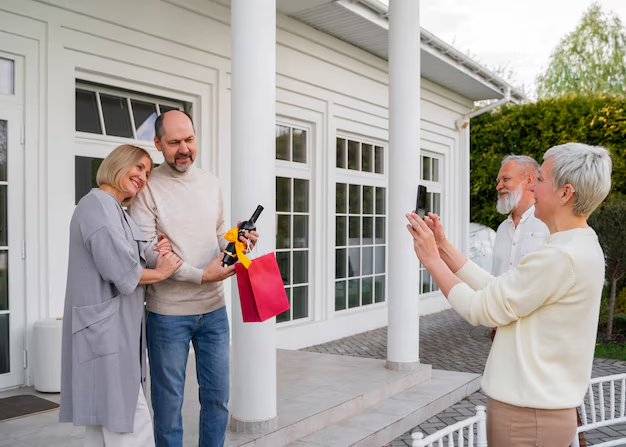As we age, finding the best alternative housing options for seniors is essential to maintain quality of life, health, and happiness. From independent living communities to more comprehensive care facilities, there are options to fit every need and lifestyle. This guide will help you explore each type, so you can make the right choice for yourself or a loved one.

what to expect:
- Aging in Place: An Alternative Housing Option for Seniors
- Independent Living Communities for Seniors
- Assisted Living Facilities: A Safe Option for Senior Care
- Nursing Homes and Skilled Nursing Facilities for Senior Health Needs
- Continuing Care Retirement Communities (CCRCs): Comprehensive Senior Living
- Choosing the Right Alternative Housing Option for Seniors
1. Aging in Place: An Alternative Housing Option for Seniors
Aging in place, or staying in one’s own home, is a popular alternative housing option for seniors who wish to maintain independence. With simple modifications, seniors can safely enjoy familiar surroundings while meeting changing health needs.
Key Benefits:
- Comfort of Familiarity: Staying at home provides emotional comfort.
- Customizable Support: From grab bars to part-time caregivers, aging in place can adapt to a senior’s evolving needs.
Things to Consider:
- Health Needs: Occasional help might be enough, or constant care may be needed.
- Home Adjustments: While some modifications are simple, others might involve remodeling costs.
Internal Link: Learn more about home modifications for aging in place here.
2. Independent Living Communities for Seniors
Independent living communities are perfect alternative housing options for seniors who remain self-sufficient but desire a vibrant community environment. These communities offer social activities, dining options, and low-maintenance living.
Key Benefits:
- Social Connections: Living in a community fosters friendships and reduces loneliness.
- Convenience: Services like housekeeping and meals ease daily routines.
Things to Consider:
- Financial Planning: Monthly fees vary based on location and amenities.
- Level of Independence: Independent living is best for those needing minimal assistance.
External Link: Explore more about independent living with AARP’s guide.
3. Assisted Living Facilities: A Safe Option for Senior Care
For seniors needing help with daily tasks, assisted living facilities offer a balanced alternative. This housing option combines a supportive environment with as much independence as possible.
Key Benefits:
- 24/7 Support: Staff is available round-the-clock.
- Personalized Care: Each resident has a tailored plan for their specific needs.
Things to Consider:
- Financial Commitment: Costs vary based on the level of care.
- Adjustment Period: Transitioning to a new environment can take time.
4. Nursing Homes and Skilled Nursing Facilities for Senior Health Needs
For seniors with higher medical needs, nursing homes and skilled nursing facilities offer a clinical level of care, including regular medical attention and rehabilitation services.
Key Benefits:
- Medical Supervision: Staffed by licensed medical professionals.
- Rehabilitation Services: Physical therapy and occupational therapy support recovery.
Things to Consider:
- Lifestyle Impact: A more clinical setting may not suit everyone.
- Insurance and Costs: Some services may be covered by Medicare and insurance; it’s essential to confirm beforehand.

5. Continuing Care Retirement Communities (CCRCs): Comprehensive Senior Living
Continuing Care Retirement Communities (CCRCs) provide a unique alternative housing option for seniors by combining independent living, assisted living, and skilled nursing care in one location. CCRCs allow seniors to transition seamlessly as their needs evolve.
Key Benefits:
- Continuity of Care: Residents can remain in one community as care needs change.
- Strong Social Bonds: Staying near friends and familiar faces.
Things to Consider:
- Upfront Costs: CCRCs may require a significant initial payment.
- Long-Term Commitment: These communities are a long-term choice and may not suit everyone.
Choosing the Right Alternative Housing Option for Seniors
Deciding on the best alternative housing option for seniors requires a mix of personal reflection and research. Health needs, financial status, and lifestyle preferences all play a role. Touring potential options and speaking with current residents can provide valuable insight.. Additionally, visiting potential options and speaking with current residents can give valuable insights.
READ MORE:
AARP’s Guide to Senior Housing Options: https://www.aarp.org/caregiving/basics/info-2021/assisted-living-options.html
Are you ready to ensure that your loved ones receive the best care at home? Stay informed and join our community support forum to receive the latest tips on elder care. https://www.formyparents
Disclaimer: The information provided in this blog is for general informational purposes only and does not constitute medical, financial, or legal advice. While we strive to offer accurate, up-to-date content, readers should consult healthcare professionals, financial advisors, or legal experts for personalized guidance regarding senior housing and care options. We are not responsible for any actions taken based on the information in this blog.
Always, to my BELOVED PARENTS:
Everyday-
I think of you
I miss you
I Love You ❤️

Recent Comments